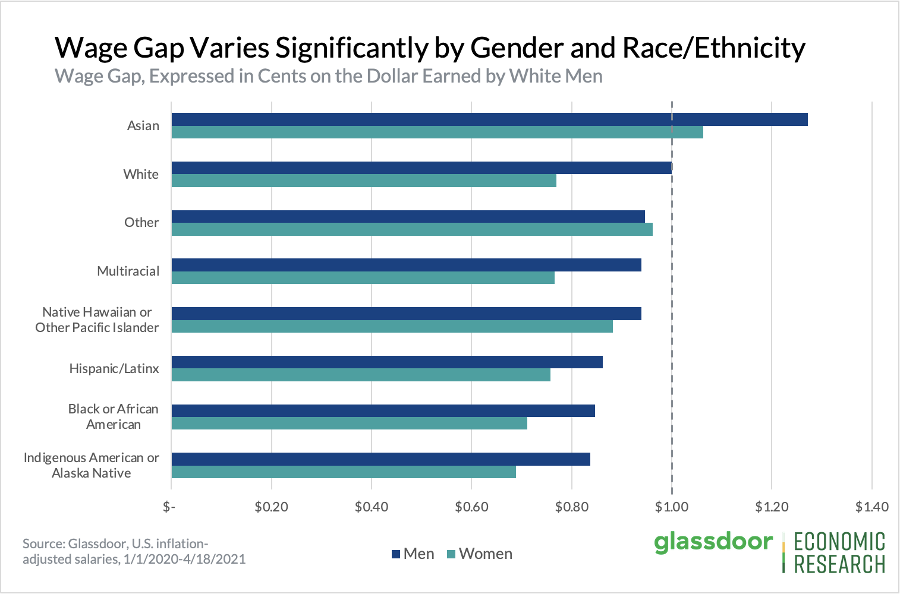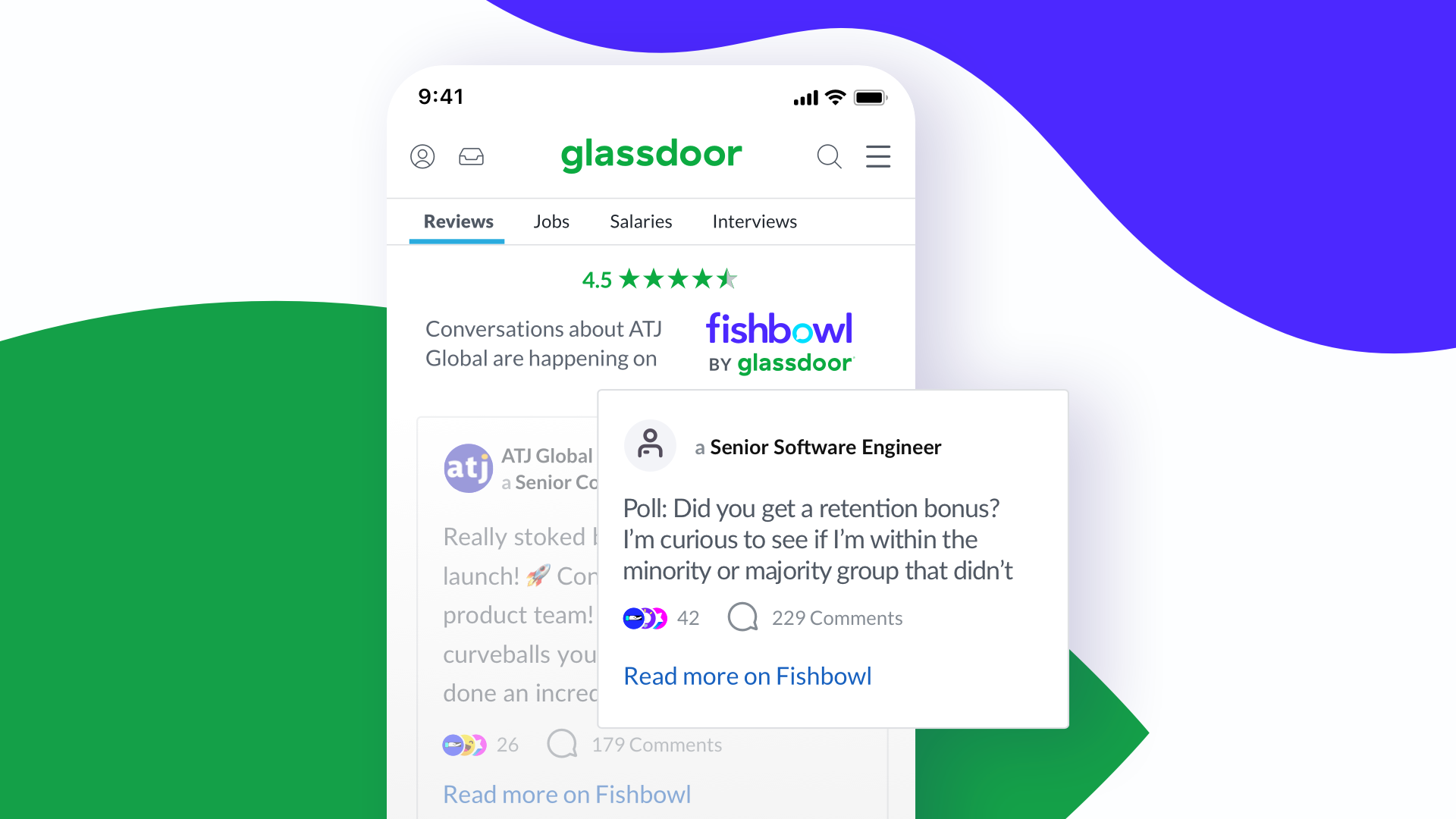To achieve equal pay, it is essential that workers know what is an
appropriate salary for their position. Glassdoor has provided salary
data for various companies for over 10 years. In September 2021, the
company began powering Fishbowl,
a social network where more than one million professionals have engaged
in candid career, industry, and workplace-related conversations.
Fishbowl by Glassdoor brings more transparency to salaries and the
workplace and promotes employee empowerment through conversation.
Not Talking About Pay Can Leave You Underpaid
Did you negotiate your salary offer before accepting your current job? Have you ever requested a salary raise after joining your company?
A report from Glassdoor*¹ revealed that the average American is underpaid by 13% because around 60% of candidates accept the first offer without negotiating for a better deal. More women than men accept their initial salary offer, and women are less inclined to ask for a salary increase. Additional Glassdoor’s reports showed that nearly 3 in 4 employed women (73%) didn’t ask for a pay raise during the COVID-19 pandemic, compared to 58% of employed men.
These results suggest that negotiating for a better salary is difficult due to a lack of transparency around compensation — but they also provide context to the ongoing gender pay gap problem in the U.S. According to a 2021 Glassdoor analysis*², American women, on average, earn 79 cents for each dollar their male counterparts earn. What’s even more alarming is the pay gap by race: Latina American women earn 76 cents, African American women earn 71 cents, and Indigenous American women earn 69 cents.
Nearly 20 states and cities in the U.S. have enacted salary history bans, which prohibit employers from asking about a candidate’s salary history, in an effort to break down structural bias and prevent wage discrimination. While salary bans are proving effective, the art of negotiating one’s salary remains a struggle for many. An underpaid worker who does not negotiate their salary could mean bad news for their long-term compensation outlook. A study conducted by George Mason University and Temple University*³ found that being underpaid and failing to negotiate salary can cost an employee $600,000 over the course of their career.

In addition to the gender gap, the pay gap by race is even more alarming.
*1 Pay data based on the 1.3 million U.S. employees who submitted
their current base pay to the Know Your Worth tool between October
18, 2016 and October 6, 2017.
*2 Source: Glassdoor
Testifies At Congressional Hearing on Addressing Gender and
Racial Pay Inequity
*3
A study conducted by Michelle Marks, associate professor in Mason’s
School of Management, and Crystal Harold, assistant professor at
Temple University’s Fox School of Business in 2010
Empowering Workers To Speak Out
Job seekers and workers should negotiate not to sell themselves short. But on what basis can you tell if you are being underpaid?
Since its founding in 2008, Glassdoor has opened salary data with
"radical transparency" to empower workers with access to salary data for
any position in any company at any time. "Transparency is the key to
achieving equal pay, and it's also essential for workers to make
informed career decisions," said Christian Sutherland-Wong, CEO of
Glassdoor. Even as a private company, Glassdoor has revealed
salary ranges
for every role at the company and disclosed the specific salary for its
senior executive team.
Now, employees and job seekers on Glassdoor can get more real-time answers to workplace and salary questions.
“Fishbowl by Glassdoor gives job seekers and employees an unmatched real-time look into the employee experience across companies and industries,” said Christian.
Professionals can dive into a private company “bowl,” or an existing pool of employees to get candid advice while fielding a new job offer or when you want to know what other kinds of benefits and support you should ask for from the company. If a professional already works for a company, they can visit an industry bowl and ask peers whether their current salary is reasonable and discuss other related topics.
Whatever situation you are in — whether you are a job seeker or a company employee — Glassdoor and Fishbowl equip you with the information needed to negotiate your salary with confidence.

Employees and job seekers on Glassdoor see relevant Fishbowl conversations. Viewing these conversations requires a Fishbowl account.
Keeping Equal Pay Moving Forward
Though the pandemic created setbacks for eliminating the gender pay gap, it is important not to lose sight of the core mission for achieving equal pay, according to Christian.
“Driving workplace transparency is and remains a cornerstone of Glassdoor since the beginning,” said Christian. "Increasing transparency is critical for employees and job seekers to make informed career decisions and help ensure pay equity."
"Our vision is for a world where transparency ensures everyone is treated and paid fairly irrespective of their gender, race, ethnicity, sexual orientation, disability or any other factor. Our vision is for a world where transparency holds companies accountable and motivates them to become better employers. Our vision is that transparency changes the world so that everyone loves their job."
Glassdoor continues to provide services that support and promote the realization of equal pay.
Related
Links
Equal
Pay: The Gender Pay Gap Breakdown - Glassdoor Blog
Glassdoor
to Power Fishbowl, A Fast-growing Professional Social Network -
Glassdoor Press Release

Christian Sutherland-Wong
Glassdoor CEO
Christian joined Glassdoor in 2015 as vice president and general manager of monetization. In 2018, he was appointed as the company’s first chief operating officer and was promoted to president in 2019. Christian became CEO in January 2020 and is responsible for leading Glassdoor’s mission to help people everywhere find a job and company they love. Prior to Glassdoor, Christian served as LinkedIn’s director of product, managing its premium subscription business, payment platform and API program. He also has experience in the business consulting and banking fields.